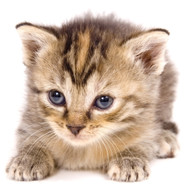Understanding Thyroid Problems
Posted by Ben Watson on 18th Feb 2016
UNDERSTANDING THYROID PROBLEMS IN DOGS & CATS
Cats may suffer from over production of thyroid hormones (hyperthyroidism) in later life. The signs of this include weight loss plus restlessness and a poor often matted coat. This is rare in dogs but they often suffer from the opposite condition of thyroid hormone deficiency (hypothyroidism). The signs of this may include lethargy, weight gain , hair loss and skin problems. Dogs with thyroid deficiency often show poor tolerance of exercise which owners may blame on obesity. Tests have shown that around 3% of dogs can have thyroid deficiency that has never been diagnosed.
TREATMENTS
Hyperthryoidism in cats
After diagnosis Methimazole is often prescribed to control hormone production in the body. If it is decided to operate on the thyroid gland to reduce hormone production then Iodine solution may be given for a 7-14 days to prepare the gland for surgery.
Hypothyroidism in dogs
There are several possible causes of hypothyroidism but all usually respond to dosage with thyroid hormone. Other medicines can lower the blood levels of thyroid including some treatments for epilepsy (eg phenobarbitone), glucocorticoids (eg prednisolone) and phenylbutazone .Thyroxine Sodium (Laevothyroxine or T4) is usually prescribed. This is given best as a once a day dose to maintain even blood levels of hormone and the main brand is licensed for use on this basis. As it is converted in the body to a more active form Tri - Iodothyronine (Liothyronine or T3) the effects are not seen for several days and results of changes in dosage are not apparent for a while.
NB Dogs are relatively resistant to thyroxine so doses are much larger than used in humans. A typical human dose is 25-100 microgrammes daily while dogs may receive well over ten times this amount. Occasionally there have been errors where 0.1mg has been prescribed or supplied instead of 1 mg.
The main brand of thyroxine tablets is colour coded to reduce this possibility.
SIDE EFFECTS
These are few and most dogs respond very well to thyroid hormone. In theory a large overdose will produce the symptoms of hyperthyroidism as described above for cats.
BLOOD TESTS
We receive many queries about understanding blood tests and suggest that initial queries are addressed to the vet. Misunderstandings can arise as the relationship between thyroxine blood levels and thyroid stimulating hormone (TSH) is complex. In general once an animal is stabilised on thyroxine a test can only confirm that the prescribed hormone is being absorbed and does not indicate the level of hormone being produced by the body. Some breeds (eg Greyhounds) tend to have low levels of thyroid hormone so hypothyroidism cannot be diagnosed from blood levels of thyroxine alone.
ARE THYROID PROBLEMS HEREDITARY ?
There may be a hereditary predisposition towards this.
DOES VACCINATION CAUSE THYROID DISEASE ?
Research has shown NO association between vaccination and thyroid deficiency conditions.

